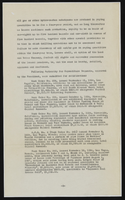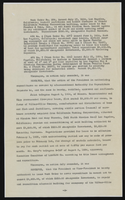Search the Special Collections and Archives Portal
Search Results
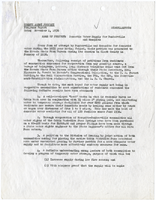
County agent project progress report, Domestic water supply for Bunkerville and Mesquite, November 1, 1936
Date
Archival Collection
Description
Having been unsuccessful in obtaining reliable domestic water, Bunkerville and Mesquite were beginning an all-out lobbying campaign on various agencies for help.
Text
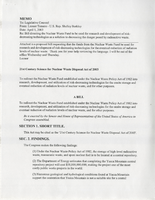

Maria Benítez oral history interview: transcript
Date
Archival Collection
Description
Oral history interview with Maria Benítez conducted by Monserrath Hernández and Maribel Estrada Calderón on June 21, 2019 for the Latinx Voices of Southern Nevada Oral History Project. Maria Benítez is the image of a hardworking and determined Salvadoran woman. After facing adversity amidst the Salvadorian Civil War she talks about her journey as a nurse in El Salvador and migrating to the United States. Here in Las Vegas, she has worked as a cook on the Strip, been an active member of her church, and supported the education of her children selling pupusas. Subjects discussed include: El Salvador, Salvadorian Civil War, Migration, US Citizenship Documentation, and Judaism.
Text

Michael Arage oral history interview: transcript
Date
Archival Collection
Description
Oral history interview with Michael Arage conducted by Dalton DuPré on November 12, 2021 for Reflections: The Las Vegas Asian American and Pacific Islander Oral History Project. In this interview, Michael Arage discusses his upbringing in the Greater Toronto Area (GTA), Ontario, Canada with his sister and his Filipino-Palestinian heritage. He talks about how his parents immigrated to the United States, his life and education in Toronto, and his relocation to Los Angeles, California where he married his wife. Michael Arage shares how the couple moved to Las Vegas, Nevada in 2012 when his wife started a job at Zappos. Because he lacked a work visa, Michael Arage began playing poker and working in sports betting. In 2019, he founded a community organization to support the people of Palestine, called Nevadans for Palestinian Human Rights. Michael Arage talks about his activism efforts, anti-Arab racism, his cultural upbringing, and of Filipino and Arabic foods and customs. He also shares his views of living in Las Vegas, the difficulties of raising a child away from her cousins, and differing governmental policies and healthcare between Canada and the United States.
Text
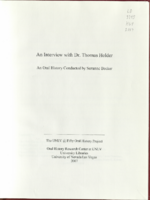
Transcript of interview with Dr. Thomas Holder by Suzanne Becker, August 08, 2006
Date
Archival Collection
Description
Text

Transcript of interview with Herb Jeffries by Cork Procter, May 5, 2009
Date
Archival Collection
Description
Text

Transcript of interview with Russell Terbeek by David Schwartz, May 29, 2015
Date
Archival Collection
Description
Text
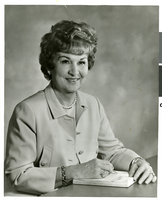
Photograph of a portrait of Judy Bayley, circa 1960s
Date
Archival Collection
Description
Image

